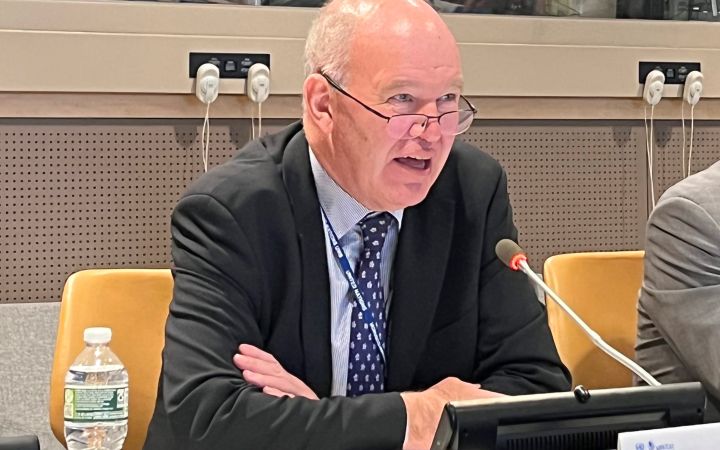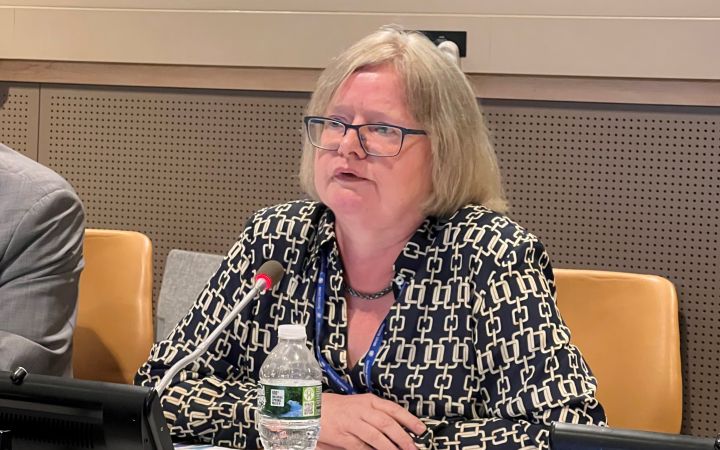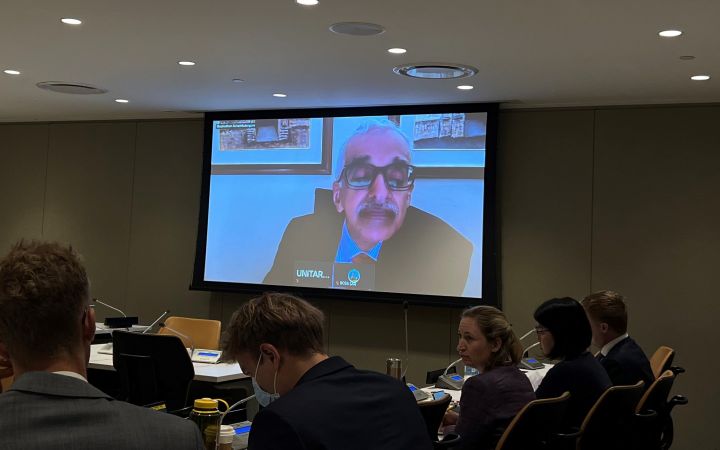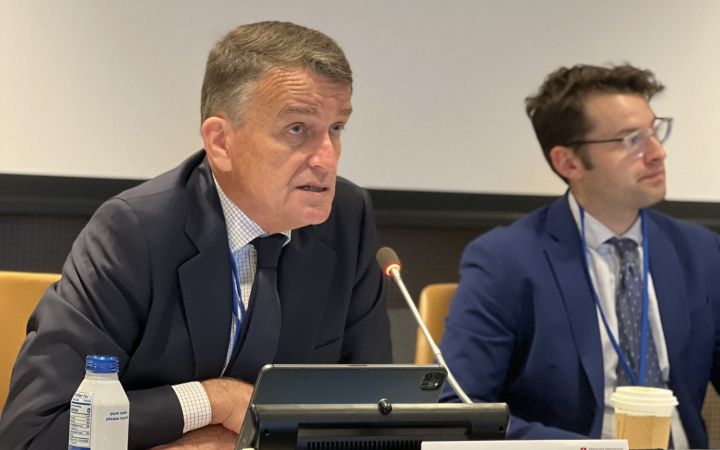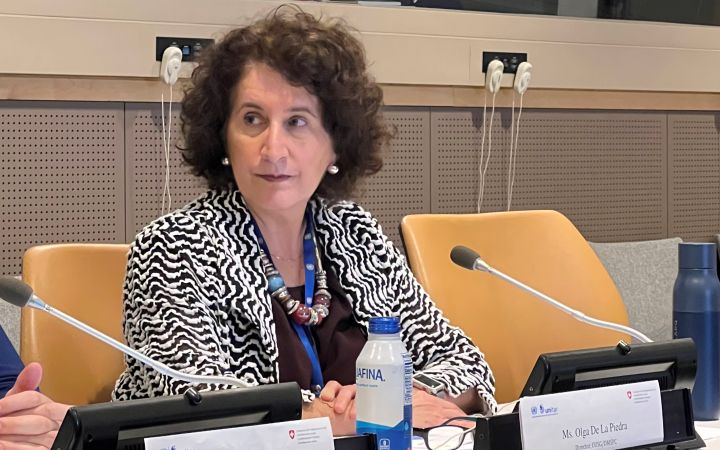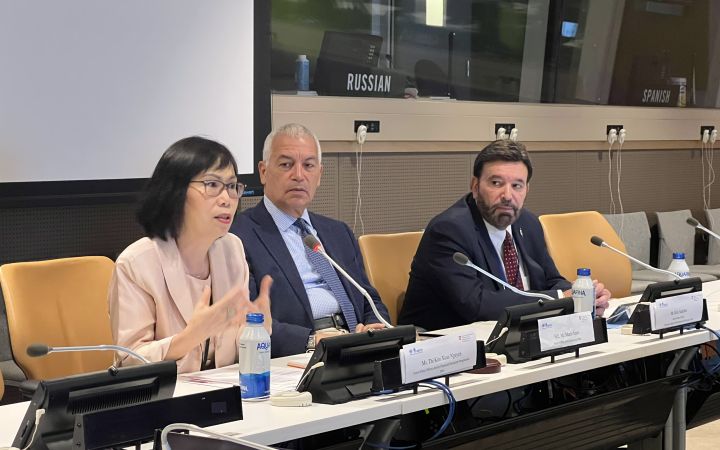8 - 9 September, New York USA, hybrid seminar - The United Nations Institute for Training and Research (UNITAR) office in New continued the Joint Swiss-UNITAR Briefing on United Nations Budgetary Matters training series on Tuesday, 6th September 2022. The four-day training programme, co-organized with the Permanent Mission of Switzerland, caters to the needs of the incoming delegates of the United Nations General Assembly’s Fifth Committee with more than 100 attendees each day.
The third day of the training kicked off at 10:00 am (EST) on September 9th. The first session of the day was covered by Mr. Ben Swanson, Assistant Secretary General, from the Office of Internal Oversight Services (OIOS). In this session, Mr. Swanson discussed several topics including the gender balance and diversity of the OIOS staff, outputs and results, the increase in investigation and evaluation resulting in an increase of posts, the peacekeeping support account being the major funding account, to name a few.
Ms. Anjana Das, Executive Secretary of the Board of Auditors (BoA) then covered the Board Members appointments and operations, the Board’s coverage (audit types), the allocation of assignments among Board Members, the Board’s reporting schedule, the expenses, revenues and assets and the GA resolutions and recommendations regarding the Board’s issues reports.
A summary of the UN International Civil Service Commission (ICSC) was then given by Ms. Regina Pawlik, Executive Secretary of the United Nations International Civil Service. Ms. Pawlik detailed the functions and powers of the ICSC, including its composition and appointment process. She also reviewed the organizations which follow and do not follow the UN Common System.
The floor was then passed to Mr. Gopinathan Achamkulangare, Chair at the Joint Inspection Unit (JIU) for the final session of the day. Mr. Achamkulangare covered several topics including guides to the JIU’s programme of work, JIU in the oversight architecture of the UN system, and how the JIU works in conjunction with the GA and other governing bodies including oversight agencies to name a few.
During the last day of the training, 09 September, the first session started with Ambassador Marco Suazo introducing Mr. Christian Saunders, Former Assistant Secretary General for Supply Chain Management, Department of Operational Support (DOS), and Ms. Olga de la Piedra, Director of Office of the Under-Secretary General (OUSG)/ Department of Management Strategy, Policy and Compliance (DMSPC).
Mr. Saunders discussed reform, saying that when the United Nations was first formed 76 years ago, it was meant solely for conferences and diplomatic negotiations. As the responsibilities of the United Nations grew, the bureaucracy changed in order to adapt to the new environment. According to Mr. Saunders, the United Nations used to be more focused on processes rather than results — and then changed the system in order to better serve the people.
Ms. de la Piedra said that the United Nations established two departments — the Department of Operational Support (DOS) and the Department of Management Strategy, Policy and Compliance (DMSPC) to emphasize accountability framework for decision-making. This is because, according to Ms. de la Piedra, although decision-making departments exist, it does not automatically mean that the department has direct capacity to provide services to execute the decision made — hence, one department can make a decision and another department can provide the services. On January 1st 2019, Ms. de la Piedra mentioned that the department introduced a revised framework for delegation of authority to emphasize transparency and accountability.
To close the session on Reforms, Mr. Saunders said that the Organization will never be done with reform. The reform paradigm is substantial, and since the United Nations is not particularly good at big changes, reform is a continuous process.
The second and last part of the training is with the Ethics Office with Ms. Thi Kim Xuan Nguyen, Senior Ethics Officer and lead of Advice/Financial Disclosure Programme Unit, and Mr. Rick Sanchez, Senior Ethics Officer and lead of Protection Against Retaliation and Outreach Unit, leading the discussion. They defined the due diligence process, stating that in the most basic sense, it means using third party solutions to do background checks and reviews on organizations that work with the United Nations. This also means touching base with the global marketplace for food vendors, suppliers, and the like.
The Ethics Office also holds ethics training and education which every United Nations staff is required to undertake. The office goes out to Missions as well, making sure the Missions know that the United Nations do not forget about them. Town Halls are usually held, in which the Ethics Office hold workshops on, for example, conflicts of interest. The Ethics Office encourages staff members and managers to come forward and tell them about corruption, toxic co-workers, supervisors, managers, and work environments.
According to Ms. Nguyen, the goal of the Ethics Office is to continue to foster the integrity within the United Nations — and because UN staff work at such a large and sometimes difficult institution, measures have to take place by continuously disseminating helpful information and being approachable anytime.
The four-day training was a resounding success and was extremely helpful to new delegates of the 77th session. Throughout the four days of training, delegates learned the ins and outs of the Fifth Committee which will immensely aid them in their work in the Committee for the coming year.


